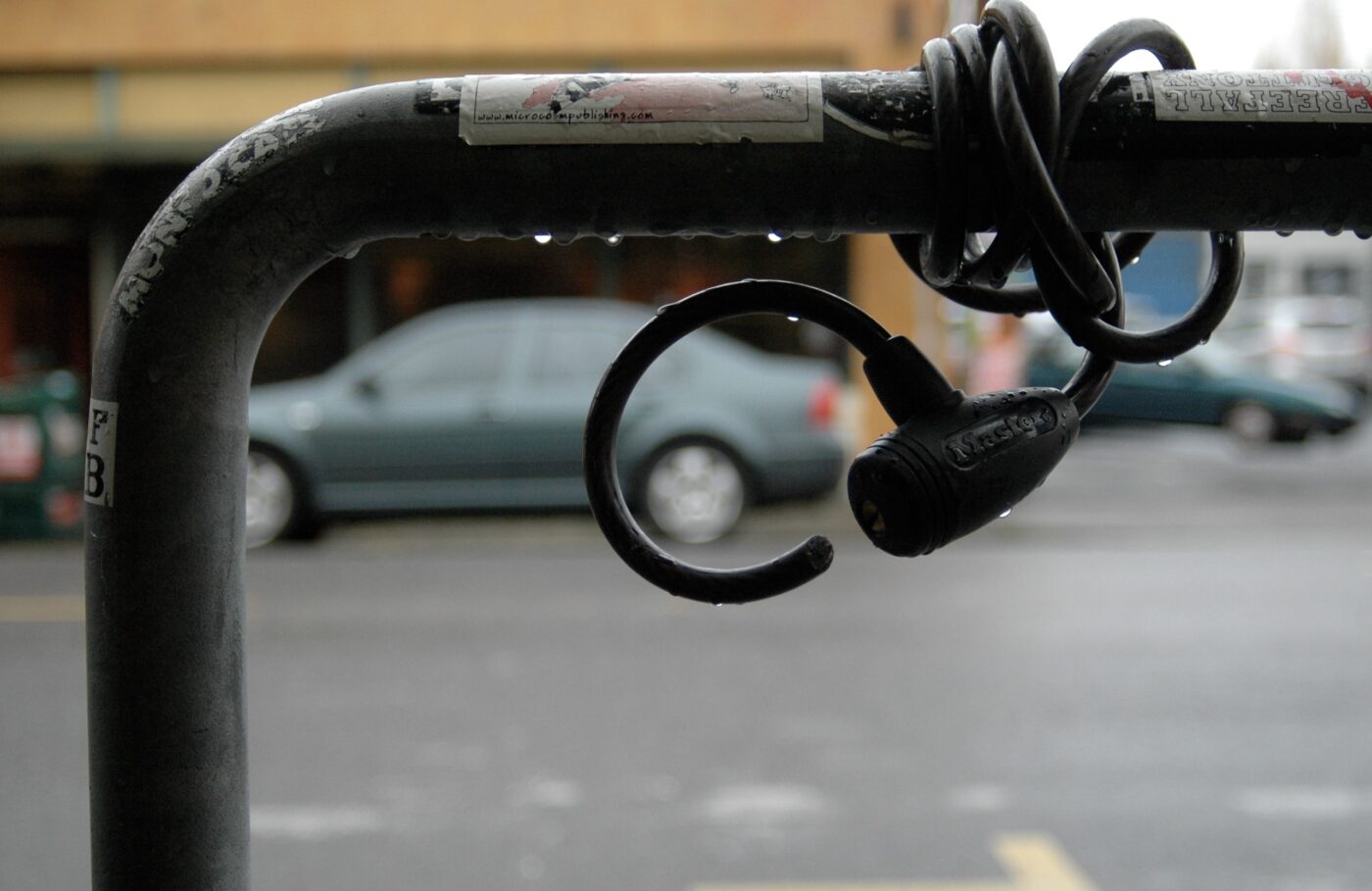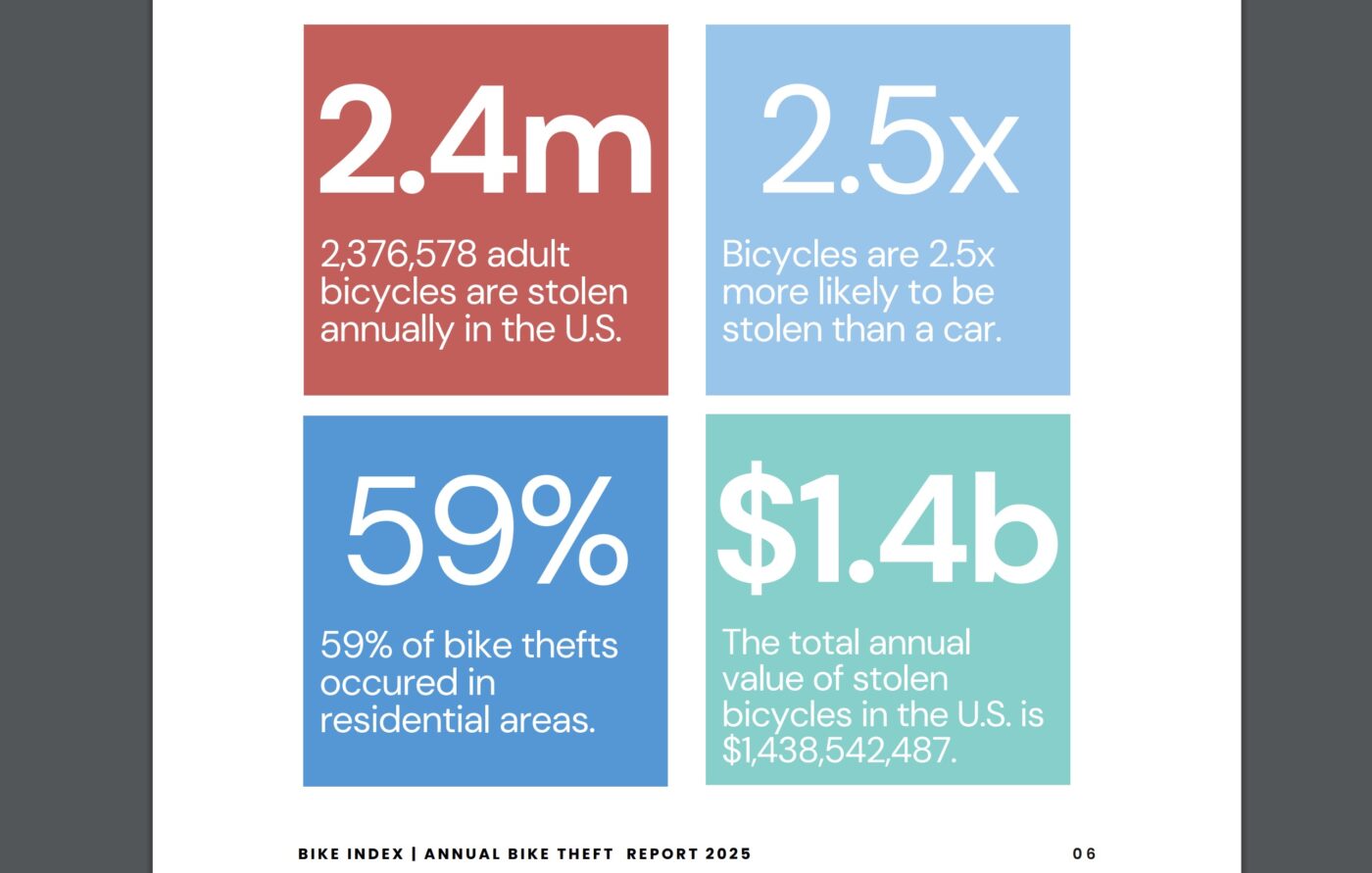Bike Index, America’s leading bike theft registration and recovery organization, has released their annual report and it paints a picture of widespread loss with an estimated 2.4 million bicycles stolen nationwide each year. Of those, 118,942 were reported stolen in the Bike Index registry last year, an increase of 15% more than 2023. The report also details that beyond the loss of a vehicle and other challenges theft poses for victims, the fact that bike theft is woefully underreported by victims and law enforcement agencies remains a big hurdle to turning the tide.
Portlander Andrew B. had his bike (estimated value, $5,000) stolen from his garage in southeast in early December. He almost didn’t even bother contacting the Portland Police Bureau about it because, “they did nothing” when he tried to file a bike theft report on two previous occasions. But this time he had an ace up his sleeve he thought would lead to a different response. “I remembered that this particular bike had an Apple Airtag concealed inside it, so I could see exactly where it was located,” he shared with BikePortland earlier this month. With this information, Andrew contacted the PPB and got in touch with an officer, who helped him create a file in the PPB’s evidence system. Unfortunately after the file was created, Andrew says the officer, “did precisely nothing.”
The lack of urgency and assistance from police (which is notably different than how they’ve responded to auto theft) is why many people don’t even bother to report stolen bikes through official channels. In their new report, Bike Index estimates 40% of bike thefts nationwide are not reported to police. And since 2021, law enforcement agencies across the nation have simply stopped reporting many crime statistics, including larceny (which bike theft falls under).
In their new report, Bike Index says, “The problem of underreporting remains a significant challenge in accurately assessing the true scope of bike theft. With many incidents going unreported, we likely will never know the exact number of bikes stolen each year.”
To try and estimate the scale of the problem, Bike Index partnered with the Institute of Transportation Studies at University of California Davis and the Department of Geography at University of California at Santa Barbara. They conducted a survey with YouGov to produce an academic study that would get them closer to the actual number of bicycles stolen annual in the U.S. Their newly published research found that along with the 2.4 million bicycles stolen annually in the U.S., bicycles are 2.5 times more likely to be stolen than a car, that the majority (59%) of bike thefts occur in residential areas, and the total value of stolen bicycles in the U.S. is $1.4 billion.
In addition to a rise in e-bike thefts and smash-and-grabs from retail shops, the Bike Index report is full of important information and advice on how to prevent your bike from getting stolen. The first thing you should do is make sure your bike is among the 1.3 million registered at BikeIndex.org. That way law enforcement organizations and helpful citizens can search for your bike when they find stolen property and you’ll be able to leverage the strength of Bike Index’s recovery platform if or when thieves snatch your rig. Where you park is also a big consideration. Bike Index says to avoid bicycle parking rooms at multi-unit buildings. If you do, use at least two quality U-locks and make sure your bike is locked to something solid that can’t be removed by thieves. And residential theft is surprisingly common, so never assume your backyard shed or porch is safe.
For Andrew B., he agonized over knowing precisely where his stolen bike was being held, yet weeks passed as he got the runaround from the PPB. He began to worry that the Airtag signal’s battery would die. After hours spent on the phone trying to reach an officer to help with his case, Andrew finally got through, only to be told by the officer that he couldn’t access the evidence system. The good news was that the officer said the property where Andrew’s bike was being held was already suspected of harboring a lot of stolen goods.
But still, a month passed and Andrew heard no progress from the PPB. They walked the property, didn’t get a response from a knock on the gate, and couldn’t make a visual of the stolen bike. Andrew continued to text his contact at the PPB and tried emailing Police Chief Bob Day, but heard nothing back. Several weeks went by and Andrew even tried contacting Mayor Keith Wilson, but he received only an automated response.
Andrew told me his experience was a, “pattern of deliberately ignoring hard evidence that would easily lead to apprehending a thief.”
When I reached back out to Andrew this week to ask if there’d been any updates to his case, he said the PPB detective finally called him back and that a search warrant on the house — where his stolen bike had been stored for nearly two months — would finally be activated.
The PPB raided the house Tuesday morning. When the suspects refused to come out it led to an all-day standoff in southeast Portland that was widely reported by local news stations. The police let Andrew onto the property later in the afternoon once things calmed down a bit.
“We found the Airtag, at the base of the hedge in the backyard,” he shared. “It was next to a dead rat. No sign of the bike.”
In the end, Andrew says he’s glad his persistence helped encourage the raid and that the suspects were ultimately apprehended. But he’ll always wonder what the outcome might have been if police hadn’t waited two months before taking action.





